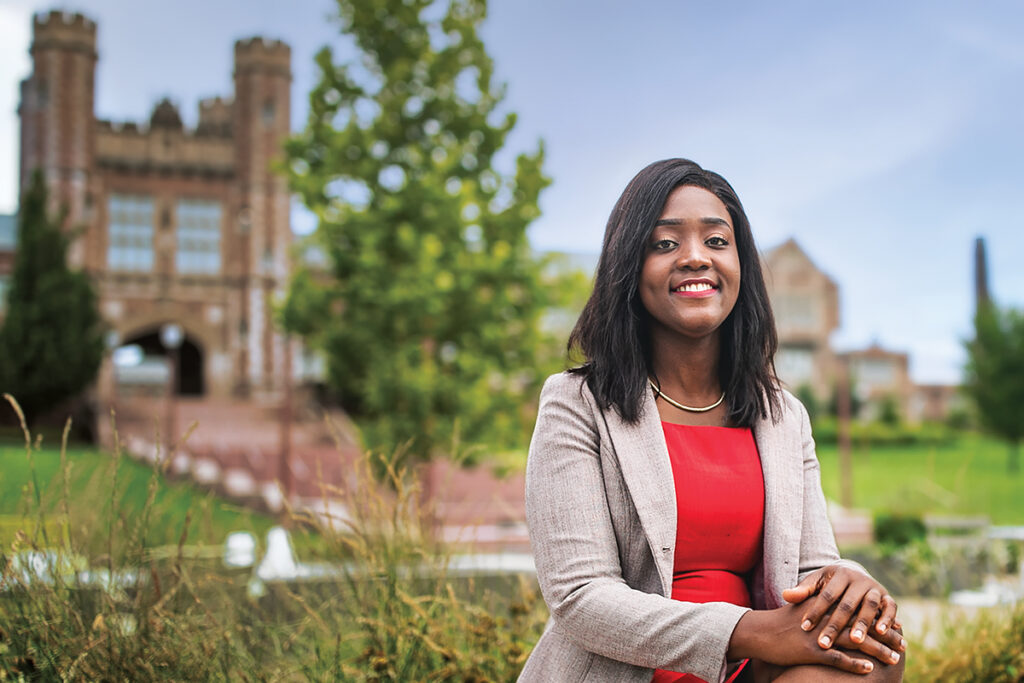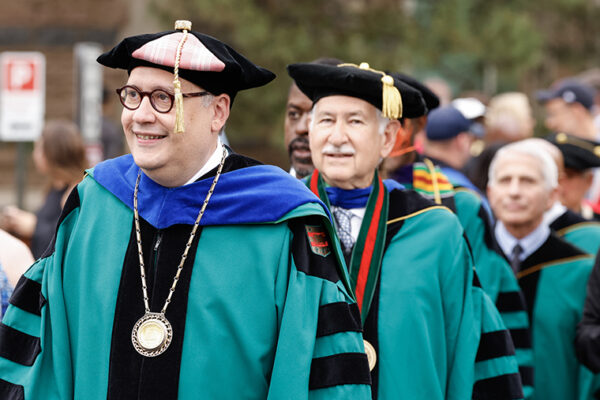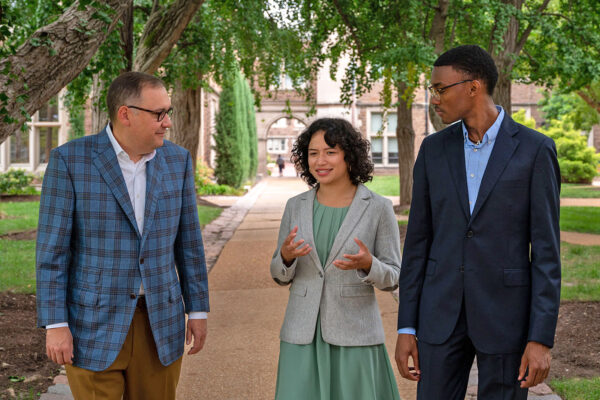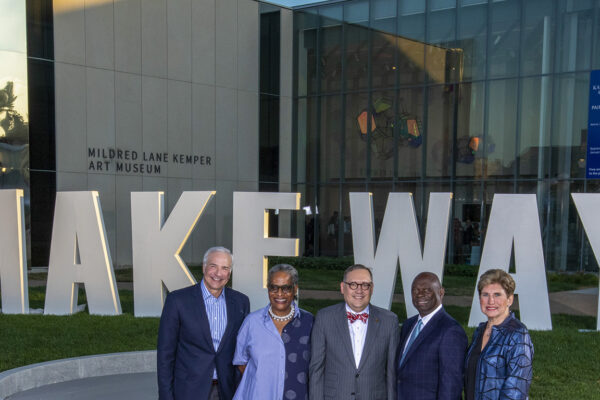College admissions, classes, co-curriculars, costs. Navigating this intricate map of choices, challenges and opportunities can be daunting for students and families. So today, WashU is laying the groundwork to provide a best-in-class experience for every student at each of these crossroads through Make Way: Our Student Initiative, a fundraising effort launched in October 2022. Starting with the acceptance letter and continuing through post-graduation career choices, the initiative aims to equip WashU to provide the meaningful support that students need to succeed and thrive throughout their college careers and beyond.
Crossroad #1: The letter
Richard Lee wanted to wait until he got home to open his Washington University application decision. He tried to ignore the notification that popped up while he was at work so that he could learn the news with his parents in real-time. But then, as he continued to make chewy tapioca pearls for boba tea, a thought popped into his mind as persistent as the notification bubble on his phone: What if WashU accepted him but didn’t provide enough financial aid?
Lee’s parents never attended college, and their work in the New York restaurant scene could not finance a WashU price tag. If there was no way to pay, Lee decided he should face that reality right away. He logged onto his WashU Pathway portal.
“And it said, ‘Congratulations!’ I was in shock. I started crying, totally breaking down in front of customers,” he says. “Then I clicked over to the financial aid and started shaking. I was like, ‘Is this how much I have to pay or how much I’m getting?’”
Not only had WashU admitted Lee, but his financial aid package meant that his family wouldn’t have to worry about the cost of his four-year education.
“It was beyond my wildest dreams that I’d be able to get into this top university and be able to afford it. Without financial support, I wouldn’t be here.”
Undergraduate Richard Lee
“It was beyond my wildest dreams that I’d be able to get into this top university and be able to afford it,” Lee says. “Without financial support, I wouldn’t be here.”
Now a junior in Olin Business School, Lee’s LinkedIn profile boasts a long tally of majors and minors and a longer list of campus leadership roles. Thanks to his mentors and a particular pair of dress shoes (more on that later), he is interning this summer at Capital One. Lee’s also on track to graduate a semester early. He’s thriving.
WashU, rightfully, loves to celebrate stories like Lee’s. Over the past decade, the university has made dramatic strides in welcoming more students whose families have limited resources and providing support to help these students succeed on campus. Twenty percent of the Class of 2026 is Pell Grant–eligible, a milestone that speaks loudly to the university’s commitment to enrolling talented students from all socioeconomic backgrounds.
Every year, however, a different kind of story lurks within the applicant pool, hidden behind jubilant social media posts sporting graduation-year hashtags. Last year, less than 30% of students who were admitted in the regular decision round chose to enroll at WashU. Every student’s situation is different, but recent years have brought a troubling trend. Many of these “students who got away” come from moderate-income families.
The so-called “barbell effect” has hit universities across the country. The barbell describes the composition of the student body, with the majority of students coming from well-resourced households (which can afford to pay tuition in full) and lower-income households (which receive substantial need-based financial aid).
Families with moderate incomes, which Student Financial Services defines as those making $75,000–$200,000 per year, must navigate a less clear-cut financial picture — one that often involves a combination of scholarships, out-of-pocket contributions, work-study jobs and loans. As a result, WashU faces a noticeable dip in yield rates from this group, considered the “bar” of the barbell.
The prospect of loans, in particular, has become a sticking point for many families, according to Ronné Turner, vice provost of admissions and financial aid.
“In order for us to be successful in our mission of enrolling the best and brightest students from around the world, we need to make sure that our scholarship and financial aid programs are as competitive as those of our peers.
Ronné Turner, vice provost of admissions and financial aid
“Often, moderate-income families won’t choose WashU because we’re still giving loans, which most of our peers have eliminated,” Turner says. “They’re trying to make the best financial decision for their families; they also don’t want their children to get into a lot of debt.
“In order for us to be successful in our mission of enrolling the best and brightest students from around the world, we need to make sure that our scholarship and financial aid programs are as competitive as those of our peers. We’ve made great progress, but we’re not all the way there,” she continues.
The good news is that we know the path forward. At WashU, more than 65% of need-based undergraduate financial aid in 2022 came from the overall operating budget — money that otherwise could be used to enhance research and teaching. At more than 10 other institutions considered our peers, that figure is lower, and in some cases drastically lower. Instead, these institutions lean on donor-funded scholarships and endowment income to cover most financial aid.
Gateway to Success, an unprecedented investment of endowed funds for undergraduate and graduate financial aid that was announced by Chancellor Andrew D. Martin in 2021, made strides in closing that gap. One of the goals of Make Way: Our Student Initiative is to bring WashU even closer to fulfilling Turner’s dream of becoming a loan-free school, evening out the barbell for good. And that’s just the beginning.
“WashU is a great institution, and we can be even better. I love to be at a place that is so forward-thinking and wants to continue the momentum,” Turner says. “For me, this initiative is all about our aspirations for how we want to educate students and help them achieve their goals.”
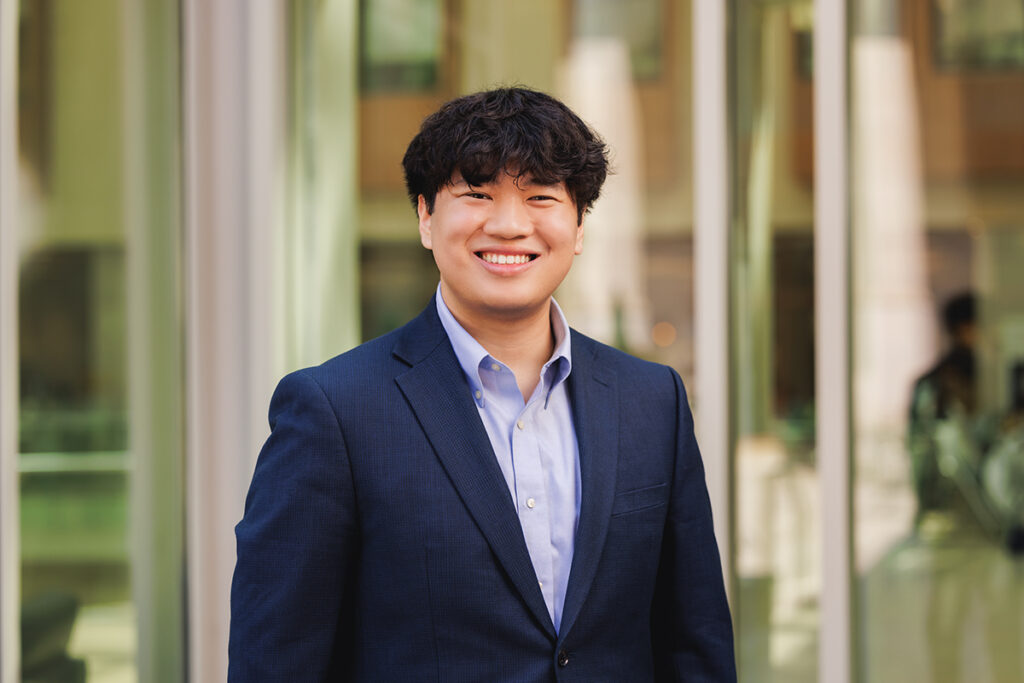
Crossroad #2: The moments of doubt
“Coming into WashU, I was blind to all the challenges I would face in my first semester,” says Trinidi Prochaska, AB ’23, who majored in biology on the neuroscience track. “Adjusting to the academic culture was a lot to handle. I was worrying about every single point in every single class. And then I didn’t know where I should make friends. It’s a lot.”
Lee had a similarly difficult time in his early days on campus. “I came in during the first year of COVID, so I felt really lost and down. I had a lot of homesickness. Imposter syndrome is real,” he says.
Too often for college students from any background, these types of stressors can spiral into mental health struggles. In a 2021 national survey by the Healthy Minds Network, an alarming 41% of college students screened positive for depression and 35% for anxiety.
“Thinking of how college was for me more than 30 years ago, I had needs, but it was different. The world was not as complex.”
Anna Gonzalez, vice chancellor for student affairs
According to Anna Gonzalez, vice chancellor for student affairs, the mental health crisis on college campuses stems in part from perennial challenges for newly independent young adults — things like establishing study habits, finding a social scene and getting adequate sleep and nutrition. (“If you’re not sleeping, if you’re not eating well, if you’re not putting oil in the machine, the machine is going to break. It just will,” says Gonzalez, better known on campus as “Dr. G.”)
Gonzalez also says the sobering statistics reflect challenges faced in the broader culture. “Thinking of how college was for me more than 30 years ago, I had needs, but it was different. The world was not as complex,” she says. For one, today’s hyper-polarized political climate leads to doubts and anxieties about voicing opinions or even asking certain questions in class.
Gonzalez and her team in the Division of Student Affairs seek to proactively address these emerging areas of concern. Thanks to a gift from the McGowan Family Foundation, this spring students took part in a new eight-week course, “Dialogue Across Difference,” that offers concrete tools and practice in how to talk through difficult topics. It’s already making a difference.
“Students have come to me and said that they’re understanding and appreciating that dialogue and listening require time and investment in one another,” Gonzalez says. “This isn’t one of those scenarios that you can push a button to fix. It requires patience.”
The new course is one of several initiatives spearheaded by Student Affairs focused on building a culture of what Gonzalez calls “healthy excellence.” Plans are in the works for a new, best-in-class health and well-being center, as well as a new course for first-year students focused on building universal skills like balancing priorities, career exploration and financial literacy.
For students seeking mental health services, WashU is also expanding the services offered by the Habif Health and Wellness Center and ensuring wait times for care stay at a minimum. A telehealth option called TimelyCare provides 24/7 access to support. Further, this fall and every year going forward, four psychology doctoral students will complete residencies at WashU, where they will serve as one-on-one student counselors. (For yet more examples, see Gonzalez’s discussion of healthy excellence in the online December 2022 issue.)
For each of these new programs — and for the future needs that will inevitably arise — Gonzalez sees the funding provided by Make Way as key. “We must stay adaptable and vigilant,” she says. For every student like Prochaska and Lee who manages to move beyond moments of doubt, other students continue to suffer.
“At WashU we are working on more than the emergency pieces. We want to do more of the preventative, educational pieces ahead of time as well,” she says. “Individuals supporting Make Way for these student-centered initiatives will provide us with a way to be creative and innovative in meeting students’ growing and changing needs.”
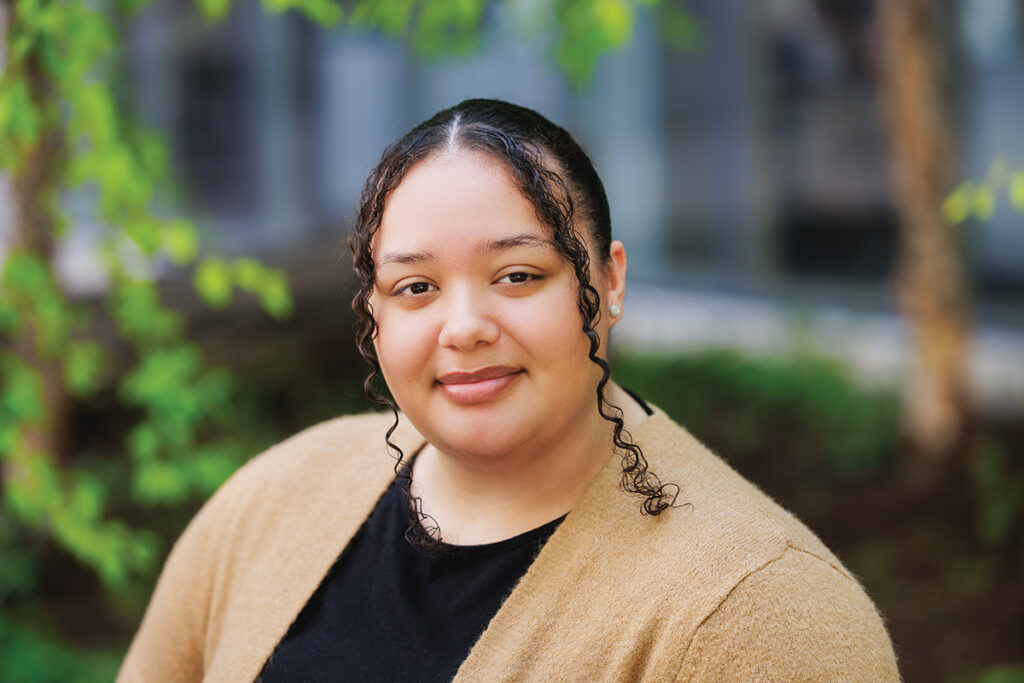
Crossroad #3: The opportunity and the dress shoes (aka the bill you didn’t see coming)
Tuition. Textbooks. Fees. Housing. Food. Shoes?
There’s no shortage of bills that come along with a college degree. Sometimes, looking out toward the future requires looking down at your feet and seeing yet another cost. Prochaska and Lee both faced this scenario when accepting professional growth opportunities — something that’s hard to pursue when your closet lacks professional clothing.
Both Lee and Prochaska are active members of Taylor STARS, a program that provides cohort-based mentorship and support for first-generation and limited-income students. Launched in 2016 as Deneb STARS, the program is now housed in the newly established Taylor Family Center for Student Success.
The Taylor Family Center also facilitates the Student Success Fund, a collection of several funding sources that eases the burdens of students facing costs for technology needs, medical bills, emergency travel and more. Recognizing the importance of comprehensive financial security for students to thrive, Emeritus Trustee John Dains, BSBA ’68, made a generous gift in 2021 that greatly enhanced resources for the program.
“WashU definitely supported me in growing my love for neuroscience and in helping me realize what I can do. When I came here, I never thought in a million years that I would go on to pursue a doctorate in neuroscience. It’s so cool to look back on my growth, greatly facilitated by all my mentors and WashU’s support.”
Trinidi Prochaska, AB ’23
“The Student Success Fund is there to bridge the gap for those of us who can’t just spit out $200 or $300,” Prochaska says. “It was really nice knowing that I had something to fall back on to help me financially.” She used the fund to purchase professional clothing to attend a neuroscience conference and, most recently, for graduate school application fees, which in her field run $80-$120 apiece.
The investment paid off. This fall, Prochaska will head to Emory University to pursue a doctorate in neuroscience.
“WashU definitely supported me in growing my love for neuroscience and in helping me realize what I can do. When I came here, I never thought in a million years that I would go on to pursue a doctorate in neuroscience. It’s so cool to look back on my growth, greatly facilitated by all my mentors and WashU’s support,” she says.
Lee faced a similar scenario when he chose to attend a business conference in his home state of New York. Conference organizers covered his travel expenses, but he needed additional funds to feel fully prepared.
“Being able to buy professional clothing gave me confidence,” he says. “It felt important to dress appropriately and to present myself like anyone else there. Coming from a limited-income background, I couldn’t afford dress shoes, ties, suits, belts — all that stuff. It’s really expensive!”
At the conference, Lee met with several employers and walked away with an internship offer in human resources.
“Empowering communities is something I’m passionate about,” Lee says. “I want to do human resources because I want to empower people within their organizations. And I wouldn’t be on this path without WashU’s support.”
Crossroad #4: The internship
Ebee Grellier, AB ’21, knows the importance of landing the right internship. In May 2020, when she faced an empty summer in Connecticut after being abruptly sent home from a study abroad program due to the pandemic, she turned to WashU’s Career Center.
Using the recommended search tools, Grellier found, applied for and was offered a position that married her interests in urban issues and public health — a policy internship with the Greenwich Village Chelsea Chamber of Commerce. There was one problem: The job came with no pay.
Once again, she turned to the Career Center, which currently provides a limited number of stipends to qualified students. After successfully receiving funding, Grellier spent the summer deeply engaged with Greenwich Village residents, businesses and public officials as the neighborhood navigated rapidly changing health guidelines. She says that she still uses knowledge gained that summer in her current work as an operations specialist with the St. Louis County Department of Public Health.
“During my internship, we were thinking about the health of the city and the health of New Yorkers who were hit hardest by COVID-19, and we were trying to make sure that people were able to keep their businesses open and had the resources to continue to serve people safely. We were having to rely on local government for every next step,” Grellier says.
“Today, I’m on the other side. I’m in the local public health department, and we’re making those decisions for our businesses and residents. It’s so valuable to have perspectives of both sides,” she says.
“My lens for how I view a partnership is so, so different because I had those kinds of hands-on experiences. My internships provided learning experiences that I couldn’t have gotten anywhere else.”
Ebee Grellier, AB ’21
The New York experience also complemented Grellier’s on-campus internship with the Gephardt Institute for Civic and Community Engagement, where she managed tens of thousands of dollars of community grant funds, and a previous internship that took her across the world to work on rural health initiatives with Uganda Development & Health Associates.
“My lens for how I view a partnership is so, so different because I had those kinds of hands-on experiences,” she says. “My internships provided learning experiences that I couldn’t have gotten anywhere else.”
And none of it would have been possible, Grellier says, without the Gephardt Institute, the Career Center and, importantly, accessible avenues for funding.
“It can be economically prohibitive to accept an unpaid internship, and the reality is that internships focused on civic engagement or any kind of nonprofit work tend to be the ones that are not funded,” Grellier says. “The fact that the Career Center can support you makes a huge difference. I would love for every student to have the kind of opportunities I had.”
That is precisely the goal of yet another Make Way priority. Funds from the initiative will support the efforts of WashU’s unified Career Center, which was created last year to establish uniform, comprehensive and effective career services for every student in every school.
The new center will be a hub for bringing employers to recruit at WashU. It will offer a
four-year career discovery program for undergrads and tailored advising for graduate students seeking careers beyond academia. And it aims to ensure that every student, like Grellier, has at least two fully funded pre-professional experiences. (For more about Make Way and the importance of internship funding, see “My Washington.”)
“We want to give students either a full stipend or supplemental pay so they can afford to live in the places they’re working or doing research,” Gonzalez says. “And we want to provide these funds for students from all socioeconomic-status backgrounds. Even if you’re a moderate-income student, there’s only so much your family can provide.”
“Internships are so valuable for figuring out what you do and do not want to do,” Grellier says. “At the time, it feels as if it’s something you’re doing during one particular summer. But what you learn stays with you and influences what you do moving forward.”
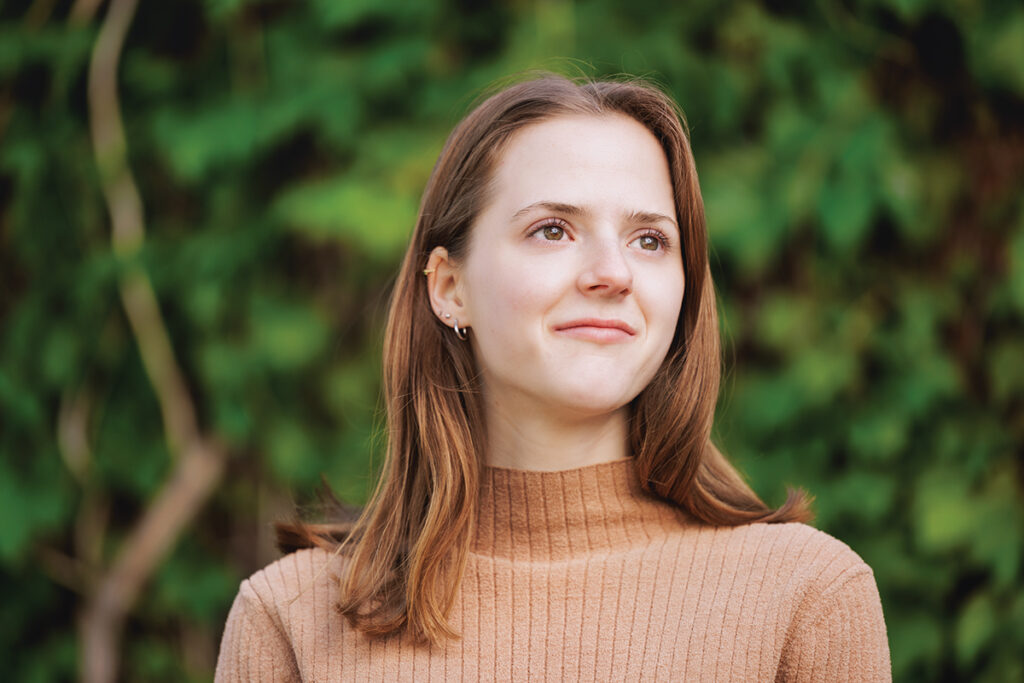
Crossroads #5: Graduate school and beyond
With her multiple internships as backdrop, Grellier chose to stay in St. Louis to make an impact. Doctoral student Portia Nartey, MSW ’21, MSP ’22, instead chose to pursue graduate school as a means to make a future impact on a global scale.
As a student at the Brown School, Nartey conducted research and policy-related work with the International Center for Child Health and Development (ICHAD), where she now works full time as a research coordinator. One project focuses on preventing young girls from dropping out of school to engage in child labor.
“I’m very passionate about and interested in women’s and girls’ development,” Nartey says. “So many countries all over the world need this.”
Nartey witnessed this need firsthand in her home country, Ghana, where as a college student she led rural outreach efforts related to menstrual hygiene management — which leads many girls to fall behind or drop out of school.
WashU became Nartey’s first choice for graduate school the moment she saw that the Brown School offered a concentration in international social and economic development through its Master of Social Work program. But she almost didn’t come here — not because she didn’t get in, she did, but due to the cost. In 2018, Nartey had to defer her acceptance. It was a devastating, although temporary, setback.
“Deferring my graduate studies, I felt hopeless. I remember I was so down for some time,” Nartey says. “But my pastor said, ‘Portia, God is going to make a way. You will definitely go to school, though it didn’t work out this year.’”
As with undergraduate applicants, too often talented graduate students miss out on a WashU education because the level of scholarship and fellowship support offered lags behind what other top-tier universities offer. Especially for Brown School students who seek careers in social work — jobs that have high social impact but often lower pay scales — it just doesn’t make sense to choose a graduate program that doesn’t give the most competitive funding offer.
“I wouldn’t be here without that additional funding. It’s going to enable me to do greater things.”
Portia Nartey, MSW ’21, MSP ’22, who is pursuing a doctorate also at WashU
Thankfully, Nartey secured additional scholarships that brought her to the Brown School in 2019 and helped finance her education, including the Elizabeth D. Ossorio Memorial Scholarship and the Betty Sims Scholarship.
Five years later, with two master’s degrees in hand as well as additional work experience with ICHAD, she is now pursuing a doctorate at WashU and has her sights firmly set on an eventual career at the United Nations.
“The UN is my target, and I want to be in a director position, where I can be doing this international development work on a large scale,” she says. “It’s a big dream, but it’s achievable.”
Across all schools, funds raised through Make Way will clear the path for more graduate students like Nartey. The Brown School has an especially ambitious goal: In the next 5–15 years, the school aspires to go tuition-free.
“I wouldn’t be here without that additional funding,” Nartey says. “It’s going to enable me to do greater things. Because when I go out in the world with my WashU degrees, I know I’ll be able to access so many places that would have been difficult without an education from this institution.”
